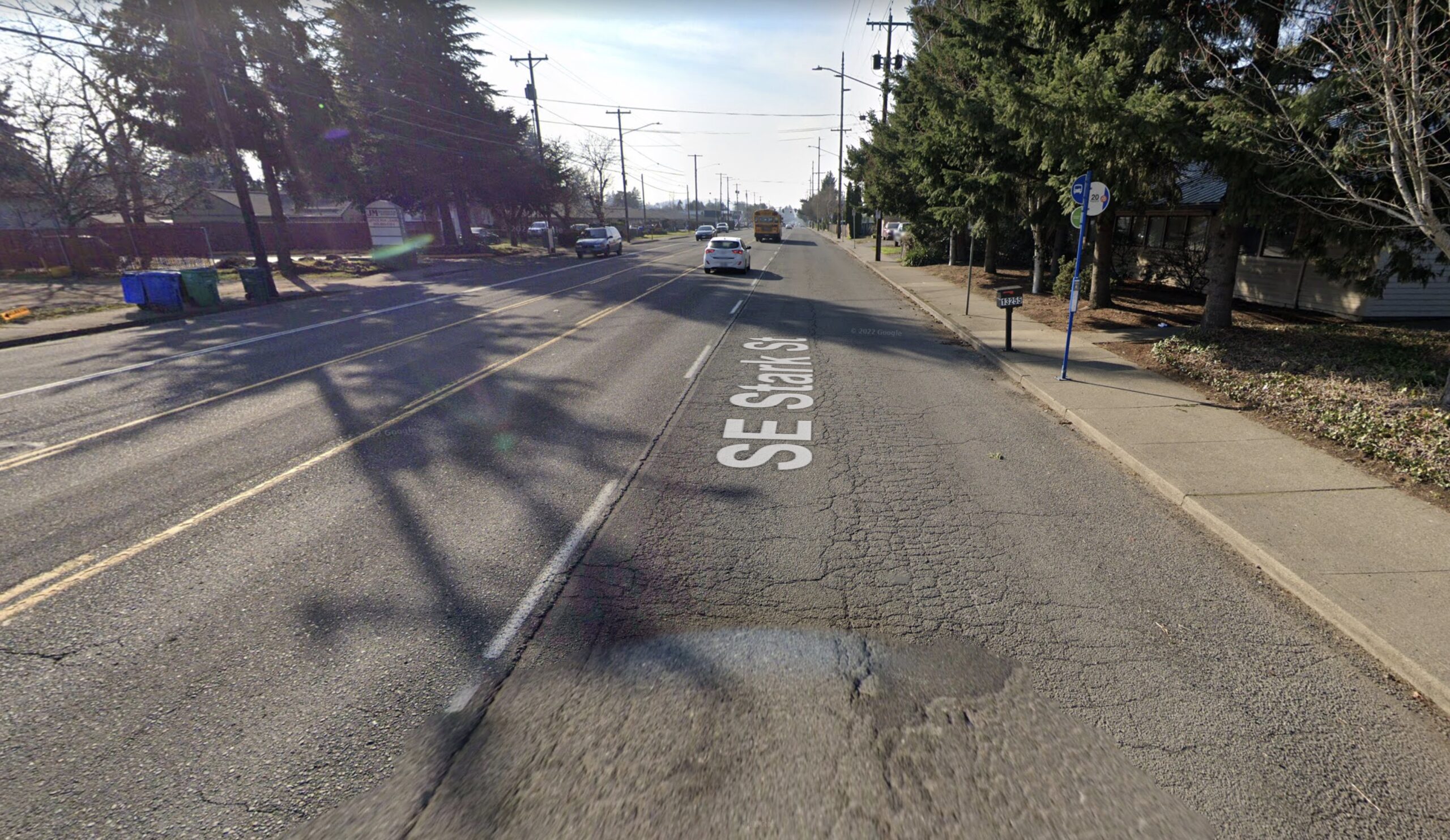
“… we will continue to see solutions that play around the edges of addressing a sick culture addicted to going nowhere fast.“
Welcome to the Comment of the Week, where we highlight good comments in order to inspire more of them. You can help us choose our next one by replying with “comment of the week” to any comment you think deserves recognition. Please note: These selections are not endorsements.
We ended the week with a post about a car-racing driver who killed a bystander on SE Stark as she waited for a bus.
This is a heartbreaking story, and BikePortland writes too many of them. Faced with yet another death, it is hard for commenters to find words that express their frustration, anger and feeling of impotence.
But ITOTS wrote a few profound paragraphs which describe the breadth our problem.
Here is a portion of their comment:
Put another way, Oslo reached vision zero in 2019. But take an average busy Oslo street or intersection and plop it down in the US, and I don’t think anyone here would call it a Vision Zero Design (TM). Everyone here can imagine a couple hoonigans jamming down that street at 50-70 mph. I’m not saying the Oslo street isn’t significantly better than a Stark. I am saying that in America, that’s not gonna get us where we’re supposed to be going.
For all the carnage our streets produce, the way they function today clearly has beneficiaries and supporters. Clearly these deaths, the so-called “cost of doing business”, are worth it—that the balance between benefits and burdens is roughly correct (access/mobility/thrills vs deaths/injuries/fears/environmental and public health impacts). Until this balance is actually seen to be publicly and institutionally incorrect, we will continue to see solutions that play around the edges of addressing a sick culture addicted to going nowhere fast, not able or willing to see beyond the bottom of a bottle, the glowing rectangle in their hand, a sense of responsibility to anything that’s not securing the next dopamine hit, let alone what’s in front of the hood of their speeding automobile.
Yes this problem is systemic (i.e. doesn’t only rest on individuals making bad choices), but there are multiple systems involved and I too often hear people setting culpability squarely on the quality or condition of infrastructure (as if we are automatons that can only do what the world around us tells us to) when that same infrastructure (or similar) can host street fairs and pedalpaloozas that transform it, curb to curb, not because we changed concrete and asphalt but because enough of us decided temporarily it should be a different kind of place. Of course there are cracks in this edifice (see: pissed-off and entitled drivers barging their way through Sunday Parkways, but again that disposition is a cultural product that not just a few people in this comment section spent time justifying in its most recently recorded instance).
But the presence of cracks in one of the pillars is fine. Because the point is this is a multivariate problem which needs a multi-pillared solution and that if places like Stark all must be transformed before people can stop dying on our streets, Portland, let alone America, won’t have the time, resources, or will to get there.
Thank you ITOTS for taking the time to write such a thoughtful comment. You can read ITOTS’s full comment, and the other comments as well, under the original post.




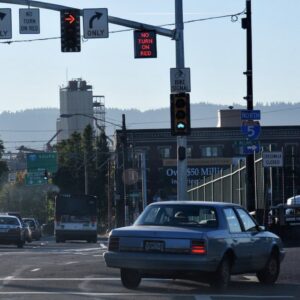
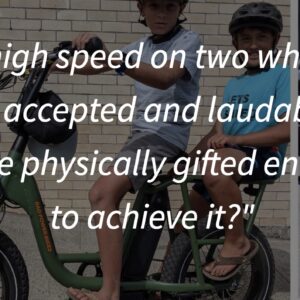
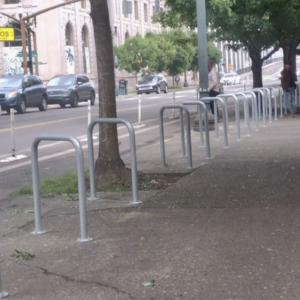
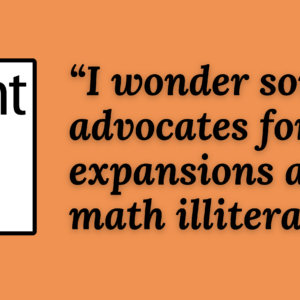
Thanks for reading.
BikePortland has served this community with independent community journalism since 2005. We rely on subscriptions from readers like you to survive. Your financial support is vital in keeping this valuable resource alive and well.
Please subscribe today to strengthen and expand our work.
“if places like Stark all must be transformed…”
This last sentence is absolutely right. Relying on infrastructure is not going to work. We need behavioral change.
We’ve done it before, making a huge dent and drunk driving and normalizing seatbelt use, but those efforts relied on education backed up by the now discredited tool of enforcement.
It may not be enough to declare causation, but there is a huge correlation in reduction of traffic enforcement and increase in reckless driving behavior. This seems to me like the fruits of another campaign to achieve “equity” by bringing everybody down.
Please do tell us why you think enforcement has been discredited.
And please be straightforward about what you mean instead of using this weaselly, dog-whistlely language
How about this:
Because deterring dangerous driving by ticketing people in proportion to the risk of crashing that their demographic groups experience appears racially inequitable to people who either don’t understand or misrepresent statistics, certain groups are condemned to die and suffer life-changing injuries in numbers disproportionate to their share of the population.
This level of suffering is unnecessary, but some apparently believe it is a worthwhile sacrifice for others to make in pursuit of the appearance of equity.
(I put equity in quotes in my original post because it is not really equity… more like “equity theater”.)
Now all that said… I have in the past argued that the communities should have some voice in how their streets are operated, so if the communities through which the high-crash corridors passed clearly said they wanted less traffic enforcement, I’d be more sympathetic to withdrawing those services than I am when the call is coming from an elite group of cycling advocates who don’t themselves live there and whose children are, consequently, at much lower risk of a random, violent death.
Great comments about behavior change being the key, but infrastructure change sure will help drive behavior change. Being on the right (actually “left”) side of equity involves absolutely no lifestyle change. No behavior change except for a very small percentage of population. Not so with a transportation system that does everyone harm. Easy for progressive politicians to defund police. Hard for them and everyone else to change behavior that is doing a lot more harm than most want to admit. Apparently, personal change happens with accepting reality. Happy to see Bike Portland and the crew of commenters illuminating the reality of this sorry situation we are in.
Quoting that last sentence in full:
What the author is saying, and what I was agreeing with, is not that infrastructure change can play no role, but rather that infrastructure improvements are slow, expensive, and politically difficult. Improving infrastructure can’t be the only answer unless we’re willing to watch people die for the years and decades it will take to rebuild all our major streets.
To reduce traffic deaths, we need multiple, layered solutions, including behavioral change. Perhaps someday infrastructure will be enough to stop reckless driving, but that’s not the case today, and it won’t be tomorrow.
Even if traffic deaths weren’t impacting some communities disproportionately, waiting on infrastructure to fix our problems is going to result in a lot of unnecessary injury and death.
Totally disagree with your comment Watts.
Also, no one (that matters, at least IMO) has “discredited enforcement.” It’s the type of enforcement that’s the problem. Last I checked even Commissioner Hardesty was very supportive of enforcement (the automated kind).
Your attempt to drag “equity” to push your narrative here is pretty sad.
So, to be clear, you’re suggesting that, what, red light/speed cameras are the only morally permissible means to enforce traffic laws?
Nope. That’s not what I think.
Personally, I think we could use a lot more automated enforcement at least until we can reform policing enough to be able to trust people who we entrust to enforce the law. For instance, I’d feel much better if we had PBOT employees enforcing some of the traffic laws.
To be clear: I do not think using armed police officers in the current cultural/training context is a good idea. The PPB in particular has not shown evidence of the required reforms to build back up community trust to the level I feel is needed. If anything, some officers and their leadership have only shown that they will put their own politics and personal agendas ahead of the safety of our city. That is very disappointing to me.
Oh alright, so traffic cams *and* meter maids, got it.
Couldn’t agree more concerning your entire comment here, but this stands out as a more focused solution to managing the majority of traffic violations than having police officers in charge.
Just as they are not properly trained to handle a mental health crisis, they also shouldn’t be the primary enforcers of traffic laws – they should only be involved as Tier 2-3 support. Leave Tier 1 support to those who are better trained, tighter focused and (frankly) less expensive.
Additionally, it also may help remove the specter of racial profiling and the fear associated with it that often has led to unnecessary violence.
When people have used the clunky term “defund the police”, it usually means shifting some resources to others who can better manage a specific type of situation. This is another good example of where that could produce much better outcomes for the cost.
Absolutely this. People get hung up on the idea that police enforcing traffic is the only option. This is exactly what “defund the police”, when interpreted any way other than bad faith, was saying. Shrink (or for that matter, stop growing) the police budget, and instead spend that money on something that doesn’t cause as much direct harm. Like having PBOT employees enforce transportation laws (kind of seems obvious when you think about it).
(This is all besides the point that police were not defunded and there is no way to correlate funding to the amount of, e.g. street racing that has started happening)
Just as a factual statement, the police were partially defunded, then, later, funding was restored. That process coincided with a lot of disparagement and denigration, followed by an exodus from the police force and ongoing difficulty recruiting new members. Budget does not appear to be the limiting factor at the moment, so I agree that insufficient funding is not the cause of the current wave of street racing and shootings.
This seems like a great time for progressives to join the police and reform the institution from the inside.
https://www.nytimes.com/2020/07/13/opinion/police-reform-progressives.html
This kind of broad accusatory belief is fueled by a political agenda that has become mainstream for “enlightened” hypocritical elitists as a means to gain allies within marginalized communities. Bandwagoning for political purpose is shameful to any degree.
Most all cops took the oath to uphold the Constitution and the laws they were entrusted to enforce to make a positive difference in their communities and to help people. Those who don’t believe that do not know any officers personally and likely have been caught and held accountable themselves for breaking the law and are bitter as a result. Or they are putty in the hands of sensationalism brought to us by media outlets that are always concerned about ratings and viewership. Capitalism at its worst. Our public broadcasting is not immune from this either as they have the same concerns. (I was listening to KMHD one Saturday morning during the pandemic to increase my tranquility and I was subjected to a jazz tune with the lyrics at the end that sang , “I think I’ll get a gun and shoot a cop.”). I am not ignoring abhorrent police behavior, but I sincerely believe it happens far less than what we are led to think and at significantly lower rates than for other walks of life that deal with similar stress levels. Yeah, yeah, injustices anywhere are a threat to justice everywhere. Well it goes both ways and you might be surprised by how many suspects who actually get processed in the judicial system get a free pass, despite having probable cause they were engaged in criminal activity or had a preponderance of the evidence they violated a traffic law or city or county ordinance. That is injustice too, with victims.
City PD’s and county sheriff’s offices have such a small amount of resources dedicated to traffic law enforcement as it is. If you get in a wreck anywhere in Portland, PPB will not respond unless there is critical injury. We are on our own to deal with the other driver(s) who are often impaired, or uninsured, or unlicensed, or driving recklessly, etc. Disobeying/ignoring speed limits is so engrained in drivers that I would argue the majority of us break this law daily. We can’t very well call ourselves law abiding citizens, if we can’t even follow this routine law that is directly related to the major cause of death to U.S. citizens under 55 years of age. Behavior has been negatively influenced by younger folks not ever being told no by their parents, who are more concerned with being friends or gaining favor over their once partner. This has resulted in a me over others mentality that is pervasive in our society and has very negatively impacted law enforcement, which was already overburdened. Most Hoonigans are in a certain young age group. They have their own nationwide following. Google Hoonigan. There is an off road race team using the name, but its more used meaning is;
Etymology
Edit
Blend of hoon + hooligan
Noun
Edit
hoonigan (plural hoonigans)
(rare, slang) someone who hoons, that is, drives in a reckless manner.
When you write “no one… has ‘discredited enforcement,'” do you mean
a. “enforcement” as an idealized principle that laws need to be followed, or some unbiased, perfectly just arbiter will levy consequences on the lawbreakers?
or
b. “enforcement” as a term people use to refer to our current system of policing and courts, used to levy consequences on lawbreakers?
My guess is that Watts is refering not to some utopian, platonic principle of “enforcement,” but rather the current system. This website has very rightly reported on elements of current “enforcement” that have not been to the justice system’s credit!
I think that “enforcement” (i.e., policing) was definitely “discredited” (i.e., brought into disrepute, having lost respectability). That’s due both to citizen reformers and police themselves.
Additionally, many facts brought to light by academic researchers in the last few years have pointed out that increased enforcement hasn’t always worked in the manner that voters and their elected leaders intended: when communities have increased their policing budgets yet seen crime increase, it’s hard to argue that even more policing would do the trick. More policing can work better, but only if the police do a better job themselves!
Even if you remove police from the equation, there has been lots of commentary about how “enforcement” without police (the automated kind you refer to) can have inequitable consequences. For instance, algorithms and racism is a well-reported phenomenon. https://www.vox.com/recode/2020/2/18/21121286/algorithms-bias-discrimination-facial-recognition-transparency
On this website, there have been numerous articles that discredit enforcement:
https://bikeportland.org/2022/07/19/despite-police-directive-portlanders-of-color-still-overrepresented-in-traffic-stops-359523
https://bikeportland.org/2020/08/27/ppb-traffic-stop-data-shows-black-portlanders-are-overrepresented-320171
You cant seriously believe that these articles are a credit to enforcement? Or do you mean the idealized, philosophical principal of optimal enforcement?
I disagree. Just to pick one example:
https://bikeportland.org/2022/07/19/despite-police-directive-portlanders-of-color-still-overrepresented-in-traffic-stops-359523
Automated enforcement can (and probably should) be part of the solution, but in an era when people think nothing of driving without license plates, and the cameras focus only on one thing, it’s just not enough.
I would be happy to phase out in-person enforcement as the traffic situation calmed down and other tools were implemented and proved effective, but right now, Portland needs it. The current situation is intolerable… or at least it should be.
We need to rein in the Freight Lobby and the amount of political sway they have in shaping our public roads.
This entire post is a strawman. No one is claiming that infrastructure alone is enough. IMO, adequate funding and implementation infrastructure that prioritizes elimination of severe injury is only possible in a sociopolitical context where systemic change is already prioritized. And by systemic I mean improved legal liability, mandatory strict licensing, mandatory safe driving education, automated enforcement, and all sorts of inconvenient laws/policies that make it very difficult for drunk drivers and reckless drivers to continue driving with impunity.
https://www.pri.org/stories/2016-02-23/these-americans-want-behave-more-swedish-road